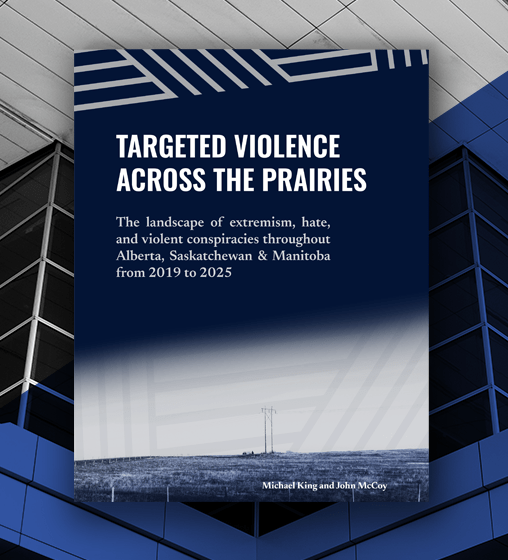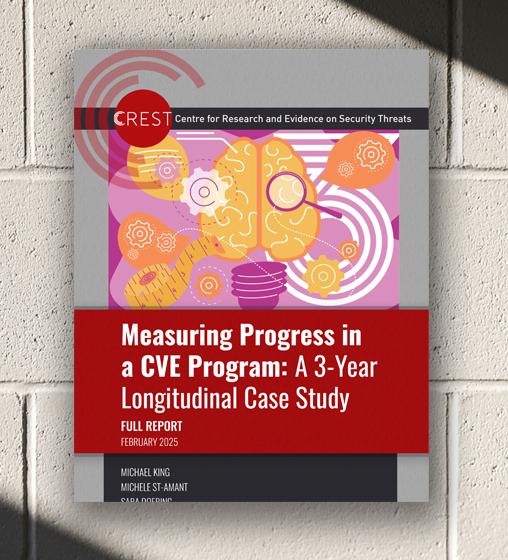Our Director of Research, Michael King, explains to Global News how the Organization for the Prevention of Violence can help Canadian women captured during the defeat of ISIS disengage from extremism.
Original Article
Published by Stewart Bell in Global News on April 5, 2023
Canadian women captured during the defeat of ISIS are on their way home after the federal government agreed to bring them back from Syria.
Kurdish authorities said four women and their 10 children were handed over to a Canadian delegation. Global Affairs Canada confirmed that on Thursday.
“Around the world, like-minded countries are taking steps to repatriate their respective citizens from northeastern Syria,” GAC said in a statement.
The Ottawa lawyer who represents their families, Lawrence Greenspon, said he did not know what awaited the women upon their return to Canada.
The RCMP would not say whether the women would face arrest for allegedly taking part in the so-called Islamic State.
Police would also not say if the women would be placed on terrorism peace bonds to protect the public, or if the children returning with them would be apprehended.
“Working closely with the Public Prosecution Service Canada, the RCMP will lay criminal charges when there is supporting evidence and when it is deemed in the public interest to proceed,” said Cpl. Kim Chamberland.
The Canadian Security Intelligence Service said only that it would “use all legal measures at its disposal to mitigate any risks that may be posed by individuals returning to Canada.”
The women left Canada and were taken prisoner by U.S.-backed Kurdish fighters in northeast Syria in the years leading up to the rout of ISIS in 2019.
The Canadian government initially declined to help repatriate them, but in December officials agreed to do so after their families appealed to the Federal Court.
But while four women were released, more remain at the camps.
Until this week, three women from Alberta were detained, and three from Ontario. A seventh woman is from Quebec and has six children but was not scheduled to return with the others because she was still undergoing a risk assessment, Greenspon said.
A Vancouver woman, Rida Jabbar, was also among those initially seeking to return, but she and her two children went missing last year and have not been located. “I only know that we have lost communication with her,” said Greenspon.
Jabbar is the wife of Muhammad Ali, a Mississauga, Ont., extremist who joined ISIS in 2014 and called for attacks in Canada. He is detained by Kurdish fighters in Syria.
Asiya Hirji, a Toronto lawyer who represents two other women detained in Syria, also said she learned from her clients the Canadians had been taken out of their camp. Hirji’s clients are not Canadians and are not among those returning, although their six children have Canadian citizenship through their fathers.
Canadian law prohibits participating in terrorism, but officials have struggled with such cases due to the challenges of collecting evidence from overseas war zones.
National security agencies have instead relied on other tools for “Canadian Extremist Travellers,” notably peace bonds, surveillance, the no-fly list and refusal of passports.
Terrorism peace bonds impose a list of conditions suspects must follow or face arrest, such as wearing an ankle bracelet and taking part in a de-radicalization program.
De-radicalization programs standing by
In Edmonton, the Organization for the Prevention of Violence (OPV) said it was available to support the women returning to the city, as well as their families.
Funded by the federal government and the City of Edmonton, the OPV runs an intervention program started in 2019 that helps extremists disengage from hate and violence.
“Mainly what we do is just try and get the person’s life in order, as a way to build trust so they feel comfortable discussing ideology with us,” said Michael King, the OPV’s director of research.
He said some of the Canadian women were at vulnerable ages when they left for Syria and Iraq and had already abandoned extremism as a result of their experiences.
“We know some of them have completely disengaged with ISIS ideology. They’re so done with it, they don’t want anything to do with it,” King said.
Rules around confidentiality prevented King from saying whether the organization was already working with any of the families preparing for the challenges of supporting the women and their children.
But he said the program was there should they ask for help, or should the courts order them to participate. “We are available to them, as we are to anyone else who is looking to disengage,” King said.
Canadian Yazidis condemn government for returning women
Among those disappointed the government is helping the women return are Yazidis, the Iraqi minority group targeted by ISIS. In what has been recognized as a genocide, ISIS executed Yazidi men and enslaved women and girls.
The Canadian Yazidi Association said the government’s decision to repatriate women suspected of involvement in ISIS has left the community feeling “abandoned and unsupported.”
“The decision has undone years of progress towards healing and rebuilding the community in Canada,” said Jamileh Naso, president of the Winnipeg-based non-profit organization.
She said that while the government was helping bring women with alleged links to ISIS to Canada, Yazidis were making little headway in persuading Ottawa to resettle their families.
Although women who joined ISIS played an active role in the Yazidi genocide, there seemed little chance they would face charges in Canada due to the challenge of collecting evidence abroad, she said.
“Ultimately, the decision to prioritize the repatriation and reunification of individuals with links to ISIS not only fails to address the ongoing trauma experienced by survivors but also undermines the progress made in rebuilding the Yazidi community in Canada,” she said.
“This demonstrates a significant misalignment of priorities for a government that claims to champion women’s rights and seek justice for survivors of sexual and gender-based violence around the world.”
Only one of three women already returned from Syria charged
Three Canadian women have already returned from the camps. The first, an Alberta resident, was arrested on a terrorism peace bond after arriving in November 2021. She cannot be named due to a publication ban.
Last October, B.C. resident Kimberly Polman was also arrested on a peace bond when she returned with another detainee, Oumaima Chouay of Quebec, who was charged with four counts of terrorism.
Global Affairs Canada agreed in December to repatriate the remaining half-dozen Canadian women and their children after their families launched a court case against the government.
The court also ordered the government to return four men who possess Canadian citizenship, but the judgment was stayed on March 14 while the government appealed. The appeal was heard on March 27.
The women believed to have been detained include Edmonton’s Helena Carson, who allegedly travelled to Syria with her husband, his sister and his sister’s husband. It was unclear they were among those returning.
Carson’s mother said in a series of text messages that her daughter was “innocent of all accusations” and claimed the women had been “demonized every which way and by ALL MEDIA OUTLETS.”
She said she had spoken to CSIS and the FBI when her daughter was detained at the Al-Hol camp in Syria.
“Whatever happened or whatever hasn’t prior to Al Hol I do not know. I only know why they left to where they went which obviously was NOT Syria, so does [Sic] ALL authorities involved in this.”
Police in Ontario were also preparing for the return of the women. Their identities have not been made public but among those in custody was a woman who said she grew up in Toronto’s Dixon Road neighborhood before marrying a Lebanese man she met online.
She told Global News in 2018 he brought her to Istanbul, and from there she was taken across the Syrian border to Raqqah, the ISIS capital at the time, she said. She claimed she was unaware of the atrocities ISIS was committing.
Another Toronto woman, Dure Ahmed, was identified by the New York Times in 2019 as having been captured in Syria, while the BBC reported a Canadian named Ammar Anjar had married a British ISIS fighter and was captured.
Lingering appeal of ISIS
Although ISIS no longer holds territory in Syria or Iraq, its ultraviolent ideology still lingers on the internet. Last week, RCMP arrested a Montreal resident over concerns about ISIS.
Mohamed Amine Assal, an 18-year-old CEGEP student over, was arrested on a terrorism peace bond after the FBI tipped off the RCMP to his alleged discussions on social media about conducting attacks.
According to RCMP allegations filed in court, he promoted “violent jihad,” translated ISIS materials and counselled an online contact on explosives.
In British Columbia, a suspect accused of attacking transit passengers with a knife on April 1 was charged with four counts of terrorism after he allegedly said he had done it for ISIS.
Stewart Bell. “Canada has planned for years to handle returnees from the Islamic State. Now the plan has to work” Global News, 5 April 2023



